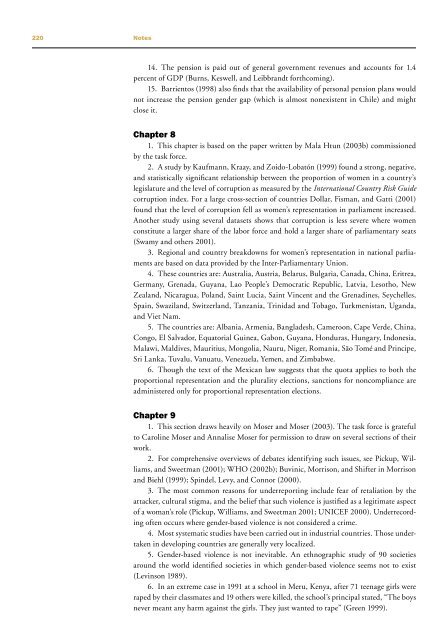Taking action: achieving gender equality and empowering women
Taking action: achieving gender equality and empowering women
Taking action: achieving gender equality and empowering women
Create successful ePaper yourself
Turn your PDF publications into a flip-book with our unique Google optimized e-Paper software.
220<br />
Notes<br />
14. The pension is paid out of general government revenues <strong>and</strong> accounts for 1.4<br />
percent of GDP (Burns, Keswell, <strong>and</strong> Leibbr<strong>and</strong>t forthcoming).<br />
15. Barrientos (1998) also finds that the availability of personal pension plans would<br />
not increase the pension <strong>gender</strong> gap (which is almost nonexistent in Chile) <strong>and</strong> might<br />
close it.<br />
Chapter 8<br />
1. This chapter is based on the paper written by Mala Htun (2003b) commissioned<br />
by the task force.<br />
2. A study by Kaufmann, Kraay, <strong>and</strong> Zoido-Lobatón (1999) found a strong, negative,<br />
<strong>and</strong> statistically significant relationship between the proportion of <strong>women</strong> in a country’s<br />
legislature <strong>and</strong> the level of corruption as measured by the International Country Risk Guide<br />
corruption index. For a large cross-section of countries Dollar, Fisman, <strong>and</strong> Gatti (2001)<br />
found that the level of corruption fell as <strong>women</strong>’s representation in parliament increased.<br />
Another study using several datasets shows that corruption is less severe where <strong>women</strong><br />
constitute a larger share of the labor force <strong>and</strong> hold a larger share of parliamentary seats<br />
(Swamy <strong>and</strong> others 2001).<br />
3. Regional <strong>and</strong> country breakdowns for <strong>women</strong>’s representation in national parliaments<br />
are based on data provided by the Inter-Parliamentary Union.<br />
4. These countries are: Australia, Austria, Belarus, Bulgaria, Canada, China, Eritrea,<br />
Germany, Grenada, Guyana, Lao People’s Democratic Republic, Latvia, Lesotho, New<br />
Zeal<strong>and</strong>, Nicaragua, Pol<strong>and</strong>, Saint Lucia, Saint Vincent <strong>and</strong> the Grenadines, Seychelles,<br />
Spain, Swazil<strong>and</strong>, Switzerl<strong>and</strong>, Tanzania, Trinidad <strong>and</strong> Tobago, Turkmenistan, Ug<strong>and</strong>a,<br />
<strong>and</strong> Viet Nam.<br />
5. The countries are: Albania, Armenia, Bangladesh, Cameroon, Cape Verde, China,<br />
Congo, El Salvador, Equatorial Guinea, Gabon, Guyana, Honduras, Hungary, Indonesia,<br />
Malawi, Maldives, Mauritius, Mongolia, Nauru, Niger, Romania, São Tomé <strong>and</strong> Principe,<br />
Sri Lanka, Tuvalu, Vanuatu, Venezuela, Yemen, <strong>and</strong> Zimbabwe.<br />
6. Though the text of the Mexican law suggests that the quota applies to both the<br />
proportional representation <strong>and</strong> the plurality elections, sanctions for noncompliance are<br />
administered only for proportional representation elections.<br />
Chapter 9<br />
1. This section draws heavily on Moser <strong>and</strong> Moser (2003). The task force is grateful<br />
to Caroline Moser <strong>and</strong> Annalise Moser for permission to draw on several sections of their<br />
work.<br />
2. For comprehensive overviews of debates identifying such issues, see Pickup, Williams,<br />
<strong>and</strong> Sweetman (2001); WHO (2002b); Buvinic, Morrison, <strong>and</strong> Shifter in Morrison<br />
<strong>and</strong> Biehl (1999); Spindel, Levy, <strong>and</strong> Connor (2000).<br />
3. The most common reasons for underreporting include fear of retaliation by the<br />
attacker, cultural stigma, <strong>and</strong> the belief that such violence is justified as a legitimate aspect<br />
of a woman’s role (Pickup, Williams, <strong>and</strong> Sweetman 2001; UNICEF 2000). Underrecording<br />
often occurs where <strong>gender</strong>-based violence is not considered a crime.<br />
4. Most systematic studies have been carried out in industrial countries. Those undertaken<br />
in developing countries are generally very localized.<br />
5. Gender-based violence is not inevitable. An ethnographic study of 90 societies<br />
around the world identified societies in which <strong>gender</strong>-based violence seems not to exist<br />
(Levinson 1989).<br />
6. In an extreme case in 1991 at a school in Meru, Kenya, after 71 teenage girls were<br />
raped by their classmates <strong>and</strong> 19 others were killed, the school’s principal stated, “The boys<br />
never meant any harm against the girls. They just wanted to rape” (Green 1999).

















